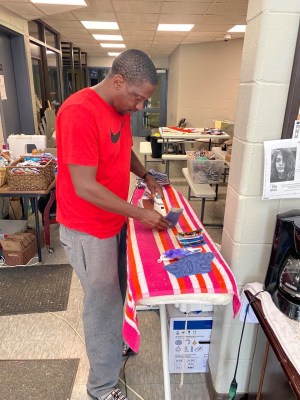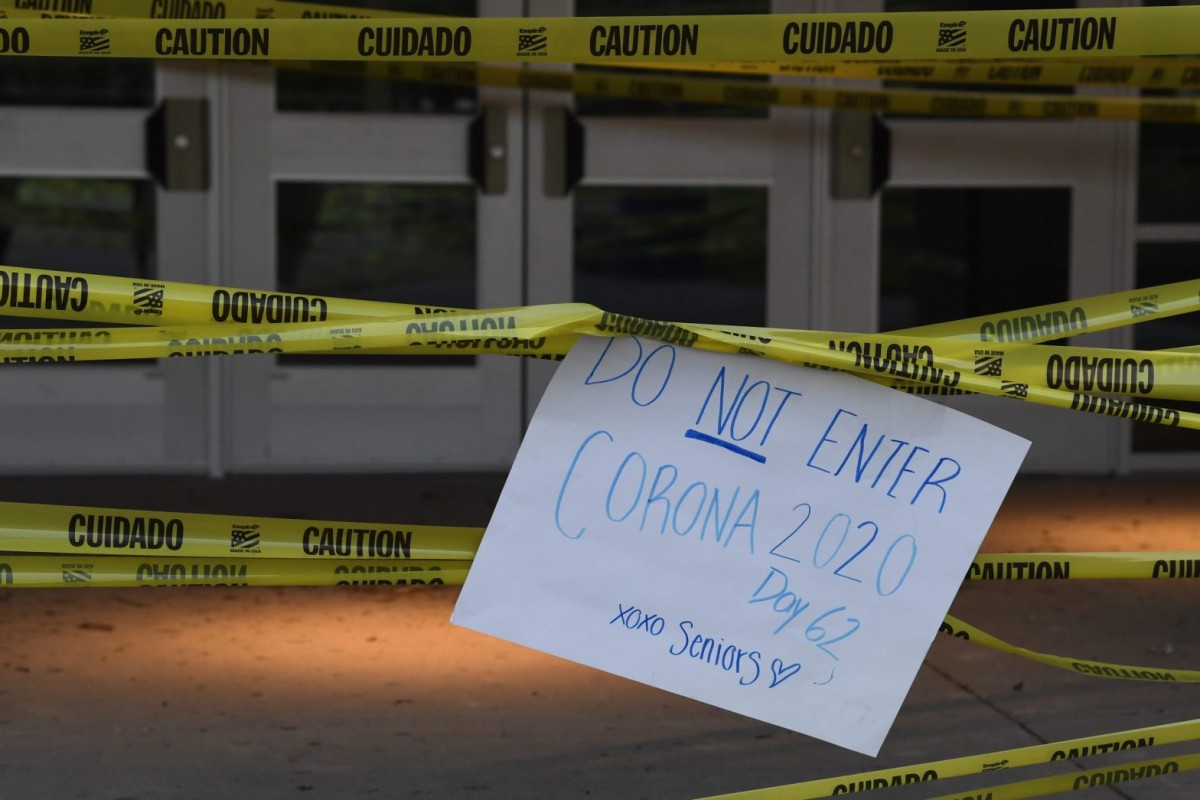A Kentucky jail has pulled incarcerated workers off litter patrol and put them behind sewing machines, cranking out masks to help stop the spread of COVID-19 in the small, central Kentucky community.
The mask-making program at the Woodford County Detention Center is helping both the region and the jail population, according to jailer Michele Rankin.
Like many jails, some inmates can work at jobs like picking up litter. The program saves thousands of dollars in labor costs each year for Versailles, the county seat of Woodford County, which has a population of about 27,000 and lies on the western edge of the Lexington metropolitan area.
When the COVID-19 pandemic response began in mid-March the jail was put on lockdown and the work programs ended, Rankin said. Of the 90 inmates in her jail, about a third are state inmates who have been convicted of non-violent offenses and are allowed to leave the jail to work.
“My state detainees couldn’t work,” Rankin, the county’s first female jailer said. “But we had tons of donations coming in of dress shirts and other clothes that we knew our inmates wouldn’t be able to wear. At the time, no one could get PPE (personal protective equipment) and I said ‘I wish we could make masks out of these clothes; we know we’re going to need them’.”
One of the cooks in the jail knew how to sew and had sewing machines, Rankin said. So she created a pattern and taught the inmates how to sew. Within a few weeks, a booming operation was up and running.
“We had enough masks for us, so I sort of advertised them on Facebook,” Rankin said. “After that, it was just crazy. It would take me an hour every morning just to get the orders.”
The orders would come in through messages on Facebook. Rankin would take the order to an inmate and the inmate would write the name and how many were needed on a paper bag and start sewing.

The inmates made hundreds for local businesses, pharmacies, factories and facilities. They made masks for city employees. They made masks for county employees. And then, they made masks for county residents. All for free.
“The material was from donations, so we just gave them away,” Rankin said.
Since the program’s inception, inmates have made more than 28,000 masks, she said, and still counting.
“I was glad to do it,” said Dustin Mahan, an inmate from Independence, Kentucky. “I never thought it’d be this big of a project. I just thought it would be something to do for a while.”
Mahan said having the mask-making project has not only given him something to do, but given him something to be proud of.
“It’s been great, Miss Michele has a heart and cares about us,” he said. “If it weren’t for her letting us do this, we’d just be laying around doing nothing… It’s pretty cool that I can look at them and say ‘I made these.’ I think it will help give guys who get out something to do when they’re released.”
Rankin said it was a good disciplinary tool, but not just to use as a carrot.
“These guys are at this from sometimes 4 in the morning until 11 at night,” she said. “And I can say to them ‘Now if you step out of line, I’ll have to stop this and that will be on you.’ But also, they feel good about it and it makes them feel good about themselves… This has probably been the coolest thing, because we’re really gotten to know them.”
It’s not unusual for Rankin to do programs that connect inmates with others. Each year, since taking over the job in 2014, Rankin has held a Father Daughter dance at the jail to encourage the inmates to stay connected to their families. And at Christmas, Rankin gets the community to donate items to the jail, so that inmates can go through and select things to give their families as Christmas presents.
“My motto is ‘Everybody is somebody’s somebody’. We give a lot of respect here. We’ll respect you, until you cross the line,” she said. “So, we try to give them these opportunities to connect with their families and with the community. These guys haven’t seen their families since February. This definitely gives them something to do.”
The inmates who work receive 63 cents a day, as well as time off their sentence. Because of the program, Rankin said, they’ve received even more support from the community.
“When we started, people wanted to give the inmates money for the masks. But inmates can’t take money,” she said. “So we started joking ‘Will work for food’ and the community really responded. They would stop by with Zaxby’s or food from Cornerstone Drug (a local pharmacy with a lunch counter) or somewhere. They just loved it because they don’t get food like that in here.”
One assisted living facility, Sayre Christian Village, posted a video to Facebook that showed the inmates working, as well as residents wearing the 375 masks the inmates had made for their residents and staff.
“Thank you so much Woodford County Detention Center. I wish I could just come in and hug you but because of the restrictions, I can’t,” said Karen Venis, CEO of the Sayre Christian Village, said in the video. “I know our residents are going to be so appreciative of your efforts of showing that love still gets in.”
Rankin said when she showed the inmates the video, they would point to it and say “I made that mask!” with a sense of pride.
In Rankin’s eyes, the program is a perfect circle. The community provided donations to the jail that allowed the inmates to make the masks. The inmates were able to provide the community with masks to protect them for free. The community in turn gave monetary donations to the jail, which it was able to spend at local businesses to keep the program going. And the inmates received a skill that allowed them to return to society one day.
Brian Traugott, mayor of Versailles, is supportive of the initiative as well.
“I proudly wear the mask they made me at the detention center, complete with Mayor embroidered on the front! I think Michele and company filled the need for a product that a lot of people were apprehensive about buying. She made them accessible and fun. The program also gave purpose to the inmates who get to feel good about giving back to the community.”
So far, there’s no end in sight for the program, she said. Inmates will keep making masks as long as there is a demand, she said.
“It’s just been blessings all around,” Rankin said. “One inmate came to me the other day and said making these masks had changed his life. Imagine that. He’s 22. It has changed his life.”
This article was originally published by the Daily Yonder.



